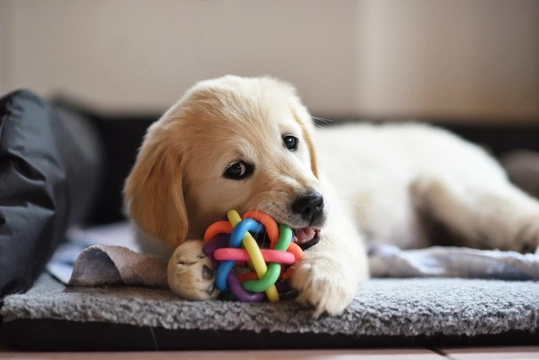
Six things that dogs like to chew that can be bad for them
Chewing is a natural canine behaviour, and one that can be very rewarding for dogs. When puppies are young and growing in their adult teeth, they actively need to chew to help the new teeth to break through the gums properly, and to ease the pain and pressure of teething.
Even adult dogs retain a strong urge to chew things, and this can help to keep their teeth clean and healthy, allow an outlet for their natural urges, and keep dogs entertained quietly while you’re out or doing other things.
However, you should choose appropriate dog-safe chew toys for your pet that are the right shape and size for your dog, and specially designed for the purpose, as such products are intended to stand up to the rigours of a chewing dog without causing them any harm.
Dogs, on the other hand, will chew all sorts of things if left to their own devices, as many of us are all too aware of – and this can be expensive and frustrating if your dog targets your child’s toys or your favourite shoes. However, chewing inappropriate things can also cause harm to your dog, and compromise their health and wellness – and there are several things you should always stop your dog from chewing for this very reason.
Read on to find out about six things that dogs often like to chew, but that can be bad for them and so, should not be permitted.
Sticks and branches
Dogs will often pick up twigs, sticks and even branches in some cases for more ambitious or larger dogs, particularly if you’ve forgotten to bring along their favourite ball or Frisbee on their walks. Whilst dogs have been picking up sticks to chew and play with for more or less as long as they’ve been domesticated, twigs and sticks can be dangerous for your dog, and you shouldn’t let them chew them.
Twigs and sticks often have sharp ends, and they can develop jagged edges and splinters when your dog chews them, risking injuries or swallowing sharp pieces that can cause internal damage too. Additionally, the bark of some tree species can be toxic to dogs, so always discourage them from picking up sticks and provide alternatives instead.
Cooked bones
Raw bones of the right type and size can make for a very rewarding dog treat, whether you choose your bones from the butcher’s counter or purchase a pre-packed specially prepared or treated bone for the purpose.
However, you shouldn’t give your dog cooked bones from meals you’ve prepared at home, because the cooking process makes the bones drier and brittler, and more apt to splinter and split in just the same way that twigs and sticks can.
The exception to this is bones that are specially cooked for dogs and marked accordingly, as these are heat treated in such a way as to kill any bacteria or parasites without increasing the chances of the bone becoming fragile or splintering when chewed.
Fillings and stuffing from toys
If your dog likes to rip up their toys, make sure that you only give them toys designed for dogs and that don’t have a loose or soft filling that might be toxic or dangerous. Some dogs that are very destructive with their toys will chew and eat the stuffing, squeakers or filling, which can cause a wide range of problems and that may necessitate surgery to resolve.
If you have children, keep their own toys well away from your dog too!
Painted or treated wood
We’ve already mentioned the fact that twigs and sticks aren’t suitable for dogs, but you should also ensure that your pooch doesn’t chew other types of wood too, particularly those that have been painted, varnished, creosoted, or otherwise treated.
Things like chair legs, wooden offcuts and fencing panels sometimes become targets for canine chewing, and if you’ve ever sawn a piece of wood up, you will know how rough and jagged wood can be once cut or marked – and your dog’s teeth can have the same effect, producing dangerously sharp areas and splinters.
Additionally, paint, wood treatment agents and other similar products are often toxic to dogs in their own right, so steer well clear!
Stones or rocks
If your dog can’t find a toy and they love to have something to carry around or chew, they may take to picking up stones or rocks instead. This makes little sense to us as people, but a reasonable number of dogs have quite the budding pet rock collection going on in their favourite hiding places!
However, stones and rocks can be jagged and sharp, and even smooth ones can pose a choking or swallowing hazard for your dog. Chewing on a stone or rock will wear down your dog’s teeth, and can also chip or damage them too.
Strings, laces and ribbons
Some dogs are serial shoe destroyers, and the sight of the dog making off with a much-loved trainer is a common start to the morning for many of us. Dogs shouldn’t be allowed to play with or make off with your shoes anyway because they’re not appropriate and also, costly to replace – but shoelaces, and even things like ribbons and string can all be quite appealing to mischievous dogs!
Don’t let your dog chew anything containing a string, lace or ribbon, or any of these items on their own, as they pose a choking hazard, an if swallowed, can cause internal complications too.
By providing your dog with a range of dog-safe, appropriate chew toys, you should be able to curb their interest in other things – and protect your dog’s health in the process.



